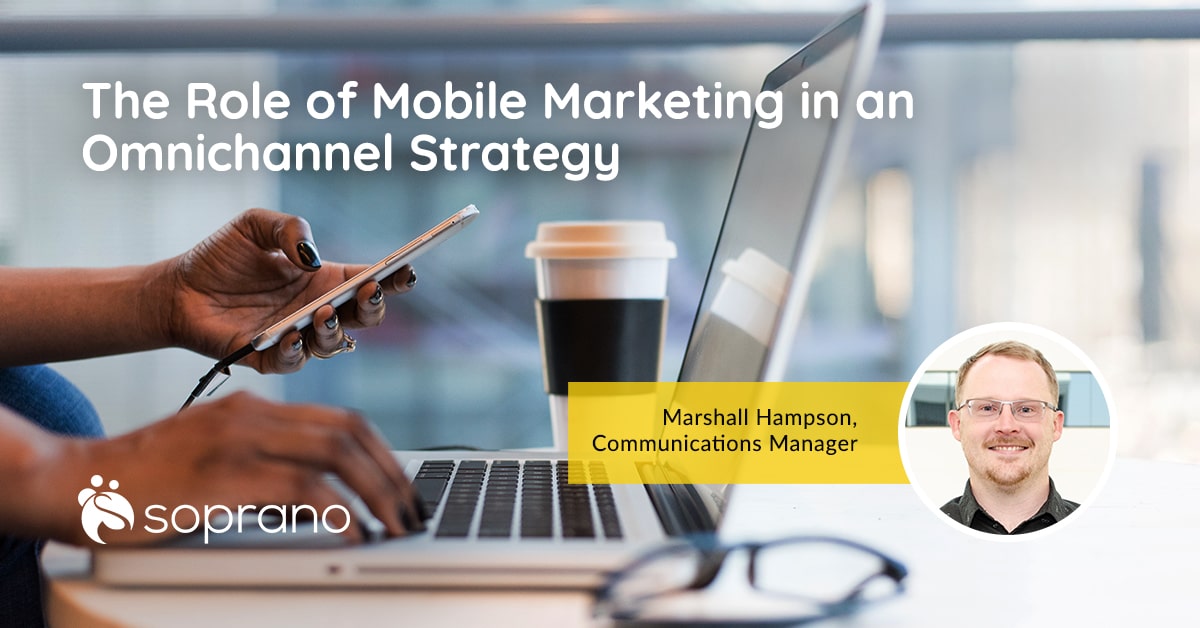The Role of Mobile Marketing in an Omnichannel Strategy
Mobile Marketing and Your Omnichannel Strategy
I see organisations and brands reaching out to me every day via phone calls, emails, text messages and more, to try to get me to perform their call-to-action. Some do it better than others aka get the hint that I prefer to have my interactions in another channel. Without a doubt, the most effective way for any brand to reach as many customers as effectively as possible is with an omnichannel strategy meaning they communicate with existing and potential customers using more than one of these channels.
Soprano help brands around the world achieve their marketing goals by empowering them with omnichannel messaging capabilities. We also help them to understand how important it is to create personalised marketing campaigns to reach their customers with the right message, on the right channel and at the right time.
Optimising Mobile Marketing Within an Omnichannel Strategy
Mobile marketing has transformed most campaigns into an omnichannel experience. The pandemic fueled this digital transformation and gave brands more options to tap into their consumers through their mobile devices. However, it’s important to remember that people want the freedom to be communicated with how they want and when they want – which is why having just one single line of reaching consumers creates a huge marketing conversion risk.
For example, there are milestones throughout customer journeys for various things that people prefer to be interacted with in different ways, depending on the product on offer. Figuring out when a person is most likely to bite on a good deal, and through what mode of communication, is most of the battle.
I love to ski and I love coffee. The reality for me personally is that I’m more likely to buy a coffee if a brand sends me an offer via SMS, but I’ll most likely buy skis or lift tickets via email since those are things I need more time to think about before I purchase. The preferences are going to look different for every customer.
Take a look at the insights and data you’re getting from each campaign and don’t be afraid to fine-tune or adjust channels on the fly. It could be as simple as changing a channel completely or adjusting how your brand is communicating during a significant milestone along the customer journey.
Personalising communications is key
At the end of the day, knowing more about the consumer gives brands more leverage to create successful marketing campaigns. It also ends up creating more brand loyalty because the customer gets the feeling they are truly known and understood by the brand. Therefore, mobile messaging is at a point where hyper-personal communications will make or break a marketing campaign.
In my experience, this mainly comes down to brands being more proactive in asking each consumer how they’d like to be communicated with. Also, while the core message will be the same across email, SMS, phone, WhatsApp or Viber, etc, the messaging for each channel should differ slightly. In essence, really knowing your customer will generally win out over simply having a message that’s been written really well.
I encourage you to think about how you’re communicated with and build out your omnichannel marketing strategy with that in mind. Going beyond the standard single channel of communication opens up more avenues for brands to interact with their loyal, returning and new customers which will produce far greater sales and marketing results.
With that, head over to our website for more information on how we can help you deliver the most effective omnichannel strategy.
Interested in learning more?
Learn About Our Omni-Channel Communications Platform
Learn about Soprano

